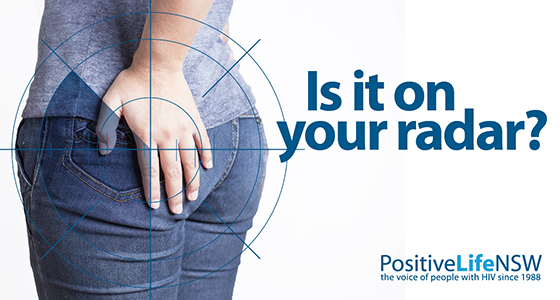If you’re living with HIV and have regular anal sex, you might be due for an anal cancer screen. While anal cancer is relatively rare in the general population, the incidence of anal cancer in people living with HIV is higher than usual.
In fact, gay men living with HIV have about 100 times the risk of anal cancer compared to the general population. While anal cancer can affect people of all ages, it’s more common in people from 50 years on.
Women living with HIV have about 15 times the risk of anal cancer compared with the general female population. And women who have had an abnormal pap screen or a pre-cancerous cervical lesion have about five times the risk of anal cancer compared with the general female population.
There are many factors that can increase your risk of anal cancer, but the biggest risk factor is a sexually transmitted virus called HPV. It’s estimated that most sexually-active men and women will get at least one type of HPV strain at some point in their lives. Because people living with HIV sometimes have compromised immune systems, we can be more likely to develop the cancers that are associated with HPV, including throat, cervical, vaginal, penile and rectal cancers.
So what can we do to protect ourselves and our anal health?
Talk with your doctor about getting the HPV vaccine (Gardasil). It’s important for both women and men to get vaccinated, which can prevent the types of HPV that cause cancer. While it’s ideal to get vaccinated before becoming sexually active, the vaccine can still be effective in preventing cancer, even for sexually-active people. It’s very safe and effective, with no serious side effects. It can also help protect from reinfection or against strains you haven’t already been exposed to.
There is currently no test to detect HPV but, there is increasing evidence of the benefits from adding a yearly digital ano-rectal examination (DARE) or an anal pap smear into your routine HIV care. A DARE is a brief painless examination of your anus with a finger by your doctor to screen for any anal abnormalities. Our chances of overcoming anal cancer are significantly higher the earlier we catch any lumps, lesions or abnormalities. Early diagnosis is the goal, so never ignore any changes you might notice including bleeding, sores, or pain in your rectum.
Not all doctors are familiar with HPV or anal cancer concerns as they relate to people living with HIV, so when you raise the subject with them they might take a little time to get up to speed on the topic. As someone you trust to monitor your health, your doctor must be someone who takes your concerns seriously. So as we live with HIV, let’s manage our health from the driver’s seat, and include new ways to stay well and healthy for longer.
Positive Life also has an online Factsheet ![]() HPV & Anal Cancer as well as a
HPV & Anal Cancer as well as a ![]() Digital Ano-Rectal Examination (DARE) Factsheet with tips and suggestions on how you can stay on top of your anal health.
Digital Ano-Rectal Examination (DARE) Factsheet with tips and suggestions on how you can stay on top of your anal health.
If you need to talk to someone about a DARE or want any support to talk about your concerns, give Positive Life a call on (02) 8357 8386, 1800 245 677 (freecall) during office hours to speak to a peer living with HIV or email contact@positvelife.org.au.
One Comment
Comments are closed.









I can relate,I just made it 27 yrs living with hiv and I also just survived anal cancer and Hodgkin Lymphoma both at the same time in 2009.